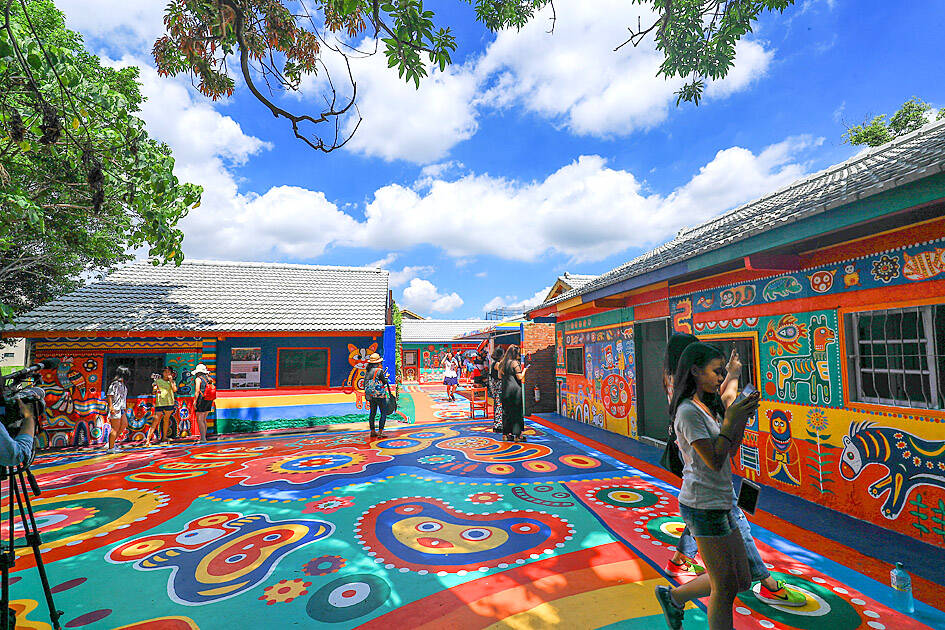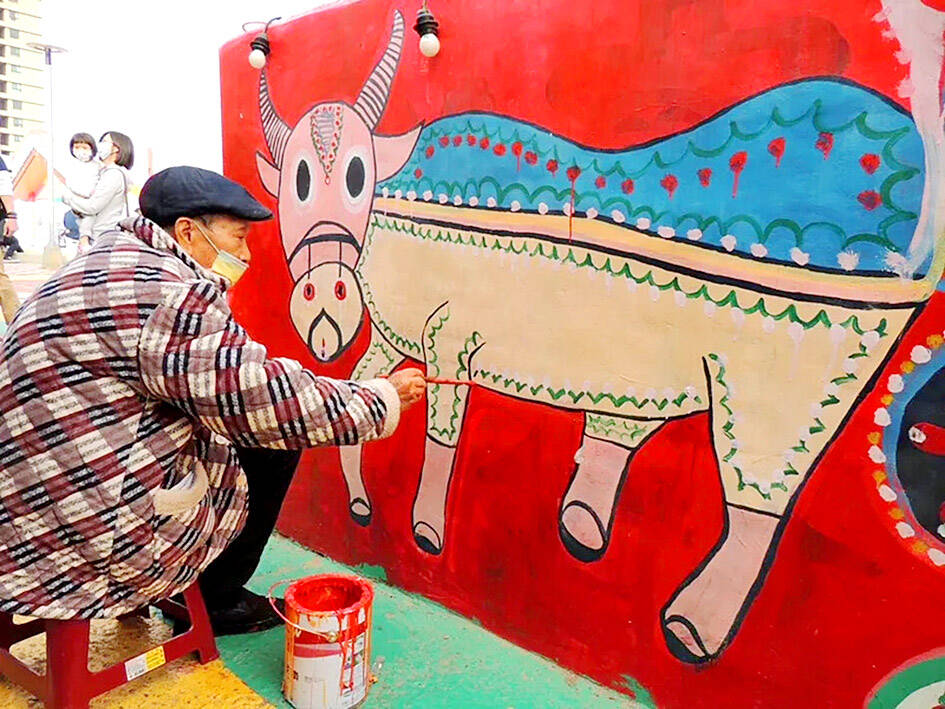Huang Yung-fu (黃永阜), the artist who created the “Rainbow Village” in Taichung, died yesterday after a long battle with illness, his family said. He was 101 years old.
Huang, a veteran and resident of a military settlement in Taichung’s Nantun District (南屯) that had been slated for demolition, in 2008 painted vivid communal murals that drew accolades from the art world, resulting in the village’s transformation from an illegal construction to a beloved tourist attraction.
More than 2 million people have visited the settlement since Huang began his creative work, which he continued well into his final years.

Photo courtesy of the Taichung City Government
Nicknamed “Rainbow Grandpa,” Huang was born in China’s Guangdong Province in 1924 and fought in the ranks of the then-Chinese Nationalist Party (KMT) government’s armies in the Battle of Guningtou (古寧頭) during its retreat to Taiwan in 1949, and in the 823 Artillery Bombardment in 1958.
Huang in recent years experienced economic hardship and relocated from the settlement to a nearby home while battling diabetes, gout and other chronic illnesses, his family said.
Huang’s daughter, surnamed Liao (廖), said her father had a nap after lunch as usual, but was found unresponsive at 3pm.

Photo courtesy of the Taichung City Government
First responders unsuccessfully tried to revive Huang for eight minutes, she said.
The Taichung Police Department’s Fourth Precinct, which conducted an investigation as a matter of routine, has preliminarily declared his death to be natural, she said.
Local police have extended help to the family with Huang’s affairs and a coroner’s inquest is to be conducted by the Taichung Health Bureau, Liao said.
Precinct Chief Lee Chien-hsing (李建興) has a profound appreciation for Huang’s contribution to the local community, arts and culture, having visited the man earlier last year, the precinct said.
Lee has made a personal contribution to the family, and requests that local leaders and charities do the same out of respect for the artist, it said.

Alain Robert, known as the "French Spider-Man," praised Alex Honnold as exceptionally well-prepared after the US climber completed a free solo ascent of Taipei 101 yesterday. Robert said Honnold's ascent of the 508m-tall skyscraper in just more than one-and-a-half hours without using safety ropes or equipment was a remarkable achievement. "This is my life," he said in an interview conducted in French, adding that he liked the feeling of being "on the edge of danger." The 63-year-old Frenchman climbed Taipei 101 using ropes in December 2004, taking about four hours to reach the top. On a one-to-10 scale of difficulty, Robert said Taipei 101

Nipah virus infection is to be officially listed as a category 5 notifiable infectious disease in Taiwan in March, while clinical treatment guidelines are being formulated, the Centers for Disease Control (CDC) said yesterday. With Nipah infections being reported in other countries and considering its relatively high fatality rate, the centers on Jan. 16 announced that it would be listed as a notifiable infectious disease to bolster the nation’s systematic early warning system and increase public awareness, the CDC said. Bangladesh reported four fatal cases last year in separate districts, with three linked to raw date palm sap consumption, CDC Epidemic Intelligence

Taiwanese and US defense groups are collaborating to introduce deployable, semi-autonomous manufacturing systems for drones and components in a boost to the nation’s supply chain resilience. Taiwan’s G-Tech Optroelectronics Corp subsidiary GTOC and the US’ Aerkomm Inc on Friday announced an agreement with fellow US-based Firestorm Lab to adopt the latter’s xCell, a technology featuring 3D printers fitted in 6.1m container units. The systems enable aerial platforms and parts to be produced in high volumes from dispersed nodes capable of rapid redeployment, to minimize the risk of enemy strikes and to meet field requirements, they said. Firestorm chief technology officer Ian Muceus said

MORE FALL: An investigation into one of Xi’s key cronies, part of a broader ‘anti-corruption’ drive, indicates that he might have a deep distrust in the military, an expert said China’s latest military purge underscores systemic risks in its shift from collective leadership to sole rule under Chinese President Xi Jinping (習近平), and could disrupt its chain of command and military capabilities, a national security official said yesterday. If decisionmaking within the Chinese Communist Party has become “irrational” under one-man rule, the Taiwan Strait and the regional situation must be approached with extreme caution, given unforeseen risks, they added. The anonymous official made the remarks as China’s Central Military Commission Vice Chairman Zhang Youxia (張又俠) and Joint Staff Department Chief of Staff Liu Zhenli (劉振立) were reportedly being investigated for suspected “serious